Revealing extraordinary stories never told publicly before, IWM North, part of Imperial War Museums, launches IWM’s first major exhibition to mark the start of the First World War Centenary.
Founded in 1917 to mark the sacrifices made by civilians and soldiers alike, IWM is a world leading authority on the First World War. From Street To Trench: A World War That Shaped A Region is the largest exhibition ever created exploring the lives and experiences of people from the North West of England during the First World War.
The free exhibition at IWM North in Manchester reveals more than 200 personal objects, films, sound recordings, photographs, artworks and letters - many on public display for the first time.
Items from IWM’s unrivalled national collections are drawn together with objects on loan to reveal the stories of lives shaped by the conflict. From poet Wilfred Owen and Clement Attlee who went on to become Prime Minister, to Victoria Cross recipients and first-hand accounts by civilians on the home front – this exhibition reveals the remarkable experiences of individuals through previously unpublished and personal items.
Explore the impact of the conflict on life in England by stepping into Stockport Market in 1914, walking down a northern terraced street, and following the journey of many to the trenches of the western front and beyond.
Graham Boxer, IWM North Director, said: ‘One hundred years on, the objects we display highlight the poignancy and courage of people who shaped and were shaped by this first global conflict. Even a century later there are stories untold, experiences undiscovered and tales that will surprise.’
As the North West was a major focus for recruitment, many left the region for the first time to serve across the globe. The exhibition reveals previously unpublished stories of soldiers, sailors and pilots who fought in all of the major campaigns, from Gallipoli in Turkey to the Somme in France and Ypres in Belgium.
On display in the From Street To Trench exhibition is a rare Albert Medal awarded to front line medic Sergeant Victor Brookes for his life-saving actions; a Victoria Cross belonging to Cheshire soldier John Davies who put his life at risk to save others; and many other little known stories uncovered by IWM researchers.
Rarely seen documents and manuscript poems provide a unique insight into famous war poet Wilfred Owen’s experiences with the Manchester Regiment and the inspiration for his poetry. On display for the first time is a letter from the Gallipoli front by officer Clement Attlee of the South Lancashire Regiment, who later helped to found the NHS as Labour Prime Minister.
Film footage in the exhibition presents an immersive snapshot of life on the eve of war, while letters by two sisters from Liverpool offer a graphic insight into civilians attitudes to the war from start to finish. Discover how Manchester - one of the first industrial cities in the first industrial war – led the way in innovation and creativity, including a trench periscope created by the owner of Duerrs jam factory, which still operates today.
The story of Altrincham’s Chapel Street – ‘the bravest little street in England’ – reveals how 161 men from just 60 houses served in the armed forces during the war. Content specially researched and curated by children from Altrincham College of Arts explores six stories of the roles, lives and legacy of local people, including those of Chapel Street.
Family visitors can crawl through a front line tunnel to find out how the sewer workers of Manchester were employed for a secret task in France, or play hopscotch on the set of a wartime street. Interactive touchscreens reveal the roles visitors of all ages today might have played in the First World War.
On display elsewhere at IWM North is the field gun that fired the British Army’s first shot of the First World War on the Western Front, the revolver carried by Lord of the Rings author JRR Tolkien on the Somme, huge paintings by First World War artist Gilbert Rogers and a 100 year old biscuit that went uneaten in the trenches.



















